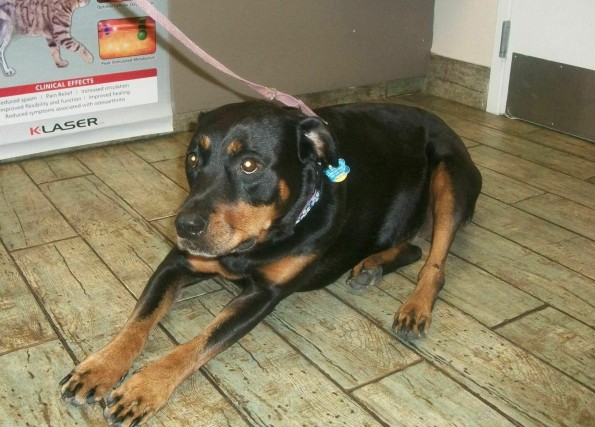 Magnolia (Maggie) Kimble was not herself when she came in to All Pet Care Hospital. This bubbly Golden Retriever had not wanted to eat for two days prior, and her family was concerned. During her exam, Dr. Rixford felt a tubular structure in her abdomen, and worried that something did not feel right. She asked if radiographs could be taken, and then an ultrasound to confirm and Maggie was diagnosed with a pyometra.
Magnolia (Maggie) Kimble was not herself when she came in to All Pet Care Hospital. This bubbly Golden Retriever had not wanted to eat for two days prior, and her family was concerned. During her exam, Dr. Rixford felt a tubular structure in her abdomen, and worried that something did not feel right. She asked if radiographs could be taken, and then an ultrasound to confirm and Maggie was diagnosed with a pyometra.
Pyometra is a uterine infection that can be sudden and, if left untreated, fatal. Pyometras occur in unaltered female dogs. There are two distinct types of pyometra based upon whether or not the cervix is open or closed. In an open pyometra, the most commonly observed symptom is discharge from the vulva. When the cervix is closed, however, the symptoms are much less clear, since all of the infection is confined within the body and no discharge is present. Some symptoms of both types of pyometra include anorexia, loss of appetite, depression, and vomiting. Pyometras can happen at any age although more common in older dogs, and in fact, Magnolia was only a little over 1 ½ years when she was diagnosed.
The treatment for a pyometra is an emergency ovariohysterectomy (spay), as the infected organs need to come out of the body before shock sets in or, in the case of a closed pyometra, before the infection causes the uterus to rupture. Spay surgeries from pyometras are more complicated than routine spays due to the fact that infection is present and the dog is generally sick at the time of surgery. Fluids and antibiotics may be needed before and after surgery to ensure a better recovery. In the case of Magnolia Kimble, she was quickly stabilized and then brought into surgery, and her procedure was ultimately successful.
Hours after her surgery one of the technicians took Maggie outside to go to the bathroom, and Maggie was trying to run around the hospital yard, a clear sign she was feeling better. Maggie was back to normal quickly thanks to her family’s swift action in bringing her in, and Dr. Rixford’s diagnosis and surgical intervention.


